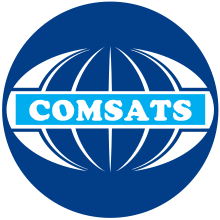Commission on Science and Technology for Sustainable Development in the South
The Commission on Science and Technology for Sustainable Development in the South (COMSATS) is an inter-governmental organization, having a membership of 25 developing countries and one non-state member from three continents, Latin America, Africa and Asia. Twenty two S&T/R&D institutions of developing countries are affiliated with COMSATS as its Network of International S&T Centers of Excellence for Sustainable Development in the South. The organization aims at sustainable socio-economic uplift of the developing countries through appropriate applications of science and technology using the approach of South-South cooperation.
 | |
| Formation | 4–5 October 1994 |
|---|---|
| Founder | Abdus Salam |
| Type | Intergovernmental Organization |
| Headquarters | Islamabad, Pakistan |
Membership | 26 |
Executive Director | S. M. Junaid Zaidi |
| Website | comsats |
H.E. John Dramani Mahama, the President of Ghana, is the incumbent Chairperson of COMSATS, who assumed this position on 24 July 2012. The current Executive Director of COMSATS is S. M. Junaid Zaidi who succeeded Imtinan Elahi Qureshi in February 2017.
The Network of COMSATS’ Centres of Excellence is governed by a Coordinating Council (comprising the heads of Network Member Institutions), the Consultative Committee (comprising the national focal points in Member States) and the Technical Advisory Committee (comprising senior scientists and technologists from the North and the South). The Consultative Committee id chaired by the Federal Secretary, Ministry of Science and technology, Government of Pakistan and the Coordinating Council elects its Chairperson from among its members. These positions are currently being held by Fazal Abbas Maken and Ashraf Shalan, President, National Research Centre (NRC), Egypt. The Secretariat of COMSATS is permanently located in Islamabad, Pakistan and is supported by the grants from the Government of Pakistan. It plays a dual role of the Secretariat and Headquarters of the Network of Centres of Excellence.
Objectives
COMSATS has the following objectives, as outlined in its Statutes:
• To sensitize the countries of the South to the centrality of science and technology in the development process, to the adequate allocation of resources for research and development and to the integration of science and technology in the national and regional development plans;
• To support the functioning and activities of the Network of International Science and Technology Centres for Sustainable Development in the South established under this agreement;
• To support other major initiatives designed to promote indigenous capacity-building in science and technology for science-led sustainable development and to help mobilize long-term financial support from international donor agencies and from governments / institutions in the North and the South to supplement the financing of international scientific projects in the South;
• To provide leadership and support for North-South and South-South cooperative schemes in education, training and research; and
• To support the relevant programs and initiatives of major international organizations working for the development and promotion of science and technology in the South.
History
COMSATS was established following a foundation meeting organized by the Government of Pakistan, held on October 4–5, 1994, at the behest of the world-renowned scientist and Nobel Laureate from Pakistan, Prof. Abdul Salam. The Inter-governmental Agreement to this effect was signed in Islamabad, with support of the Ministry of Science and Technology (MoST), Government of Pakistan, The World Academy of Sciences (TWAS) and the Consortium on Science, Technology and Innovation for the South (COSTIS).
Major Programmes and Projects
COMSATS programmes and projects relate to the socio-economic needs of its member countries. In this context, the organization focuses on:
- Capacity-building through education and training, seminars, symposia, workshops, fellowships and expert-exchange programs;
- Research and development through joint projects in scientific fields, like Information and communication technologies, agriculture, environment, biotechnology, medicinal products, materials sciences, etc.
- Knowledge dissemination through COMSATS publications, web-sites/web-portals;
- Higher education in Science and Technology with the support of COMSATS’ Centres of Excellence and their affiliated institutions in the member countries.
On-Going Projects
- COMSATS University Islamabad (CUI)
- COMSATS Internet Services (CIS)
- COMSATS Tele-Health Services
- Syrian-COMSATS-COMSTECH Information Technology Center (SCCITC), Damascus - Syria
- ISESCO-COMSATS Islamic World Science Net (IWSN), Web-portal
International Collaboration
Keeping in view the common goals of building and promoting indigenous capacities in science and technology for science-led development, COMSATS has signed a number of Memoranda of Understanding (MoU) with various Ministries, International Organizations and Academic Institutions, to effectively conduct developmental initiatives. Also, the organization has close working relations with various development and donor agencies, such as UNESCO, ISESCO, TWAS/TWNSO, COMSTECH, ICGEB, etc.
Further reading
- Cook, Nancy (2007). Gender, Identity and Imperialism: Women Development Workers in Pakistan. Macmillan Publishers. ISBN 978-1-4039-7991-9.CS1 maint: ref=harv (link)
- Polishuk, Paul, ed. (December 1996). "Global One Technology Brings New Capabilities to Emerging Nations". Russian Telecom Newsletter. Information Gatekeepers, Inc. 3 (12). ISSN 1080-2169.CS1 maint: ref=harv (link)
- Wootton, Richard; Patil, Nivritti G.; Ho, Kendall (2009). Telehealth in the Developing World. International Development Research Centre. ISBN 978-1-85315-784-4.CS1 maint: ref=harv (link)